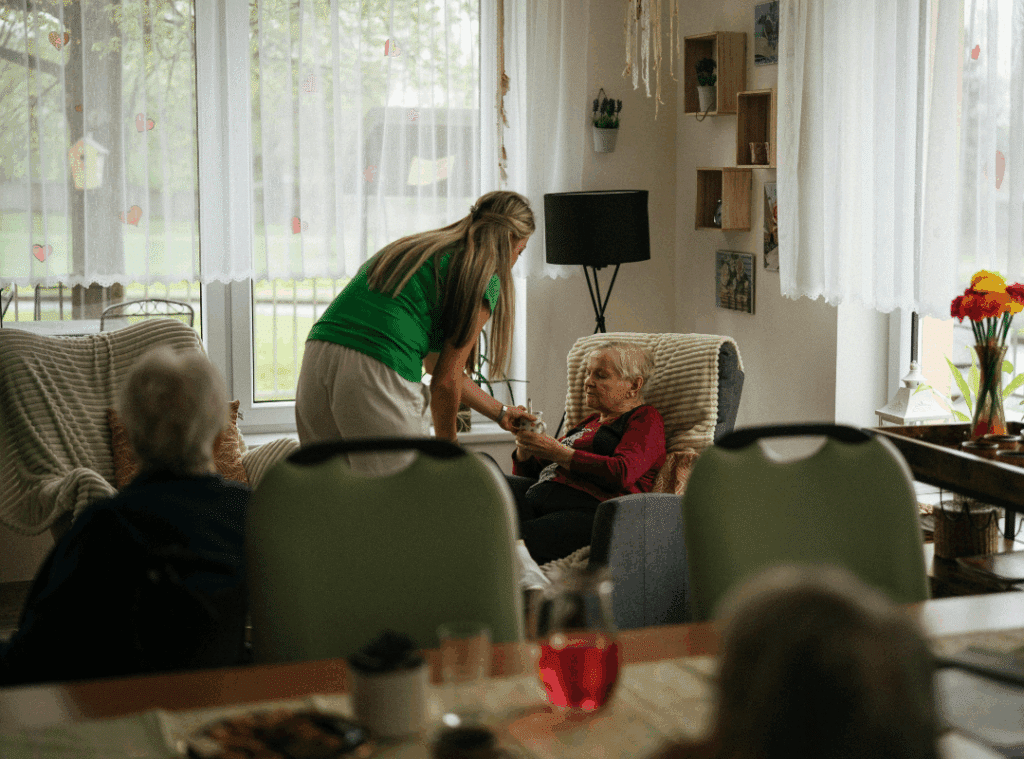As loved ones age, families and caregivers often face the challenge of ensuring both safety and independence. Fortunately, senior care technology is transforming how we care for older adults, offering practical solutions that reduce risks and promote well-being. From health monitoring tools to smart home innovations, these advancements are tailored to support seniors—especially those living alone—and reduce caregiver stress.
Whether you’re seeking tools to improve medication adherence, track movement, or monitor vital signs, senior care technology offers real-time support, helping seniors stay safe, healthy, and connected. At Westmont Village Homes, we implement these innovations to enhance the quality of life for our residents and their families.
Automated Pill Dispensers: Reliable Medication Support
Medication management is one of the most critical aspects of senior care. For many families, automated pill dispensers eliminate the guesswork. These devices ensure medication is dispensed at the right time, in the right dosage—reducing the chances of missed or double doses.
This technology is especially valuable for old people and technology because it simplifies a potentially confusing task. Caregivers can feel confident knowing the system sends reminders and even notifications if a dose is missed. Automatic medication dispensers also store multiple medications for seniors with complex health needs.
With more demand for tech-savvy roles, senior care technology jobs now often include configuring and managing these systems—proof of how integrated these tools have become in modern caregiving.
Medical Alert Systems: Safety with the Push of a Button
Emergencies happen, and when they do, every second counts. Medical alert systems provide instant access to emergency services, giving both seniors and caregivers peace of mind.
Whether worn as a pendant or wristband, these devices are a lifesaver for seniors living alone. With a single press, help is summoned, and some systems also detect falls automatically. These tools are especially helpful for those with limited mobility or chronic conditions.
Combining this with relaxing activities for anxiety can make emergency responses less stressful for seniors.
GPS Tracking: Peace of Mind for Wandering Risks
Wandering is a common concern for seniors, particularly those living with memory challenges. GPS tracking devices provide a way to ensure their safety without limiting their independence.
With real-time updates and geofencing, caregivers are instantly notified if a senior leaves a designated safe zone. GPS systems are especially helpful for technology for seniors living alone, offering reassurance when no one else is physically present.
Many modern tracking tools also support health monitoring gadgets, giving caregivers a comprehensive overview of their loved one’s well-being.
Learn more about GPS tracking for seniors via AARP.
Telehealth: Doctor Visits Without Leaving Home
Gone are the days when seniors had to rely solely on in-person doctor visits. Telehealth platforms allow video consultations, medication reviews, and therapy—all from the comfort of home.
This is a game-changer for future technology for elderly care, especially for those with limited mobility or transportation access. Virtual visits help seniors stay on top of their health while giving caregivers a clearer picture of what’s needed.
The convenience of telehealth reduces hospital visits, supports medication adherence, and is often covered by Medicare or insurance. It’s a key reason why senior care technology jobs are growing rapidly in IT and healthcare support sectors.
Wearable Devices: Monitor Health in Real Time
From smartwatches to heart rate monitors, wearable devices allow seniors to track their vitals and alert caregivers in real time. Features like fall detection, emergency SOS, and sleep tracking offer daily health insights.
These tools are especially beneficial for older people and technology, as they’re often user-friendly and sync automatically with apps that caregivers can access.
Devices like Fitbit and Apple Watch can detect irregularities and notify family or health professionals—allowing for proactive care. For a broader perspective, check out HealthTech Magazine on how wearables are reshaping elder care.

Smart Home Technologies: Safer, Smarter Living
Smart home technology enhances safety, convenience, and independence for aging adults. Whether it’s lighting, security, or climate control, these devices can be managed with a voice command or phone app.
At Westmont Village Homes, we integrate these innovations to support aging in place and maximize autonomy.
Enhanced Home Security
Smart locks and surveillance cameras ensure that seniors feel safe in their homes. These tools reduce the risk of unauthorized access and allow family members to monitor safety from afar. Many smart home devices can also detect unusual activity, prompting quick responses.
For technology for seniors living alone, this offers a secure layer of protection that adapts as needs change.
Voice-Activated Assistance
With tools like Alexa or Google Home, seniors can control lights, ask for weather updates, or call loved ones—all hands-free. This reduces fall risks and promotes confidence for those who struggle with mobility.
Voice technology is also a breakthrough in future technology for elderly care, giving seniors a greater sense of control and connection to the world around them.
Real-World Impact of Senior Care Technology
Imagine a scenario: A senior lives alone, but thanks to an automated pill dispenser, a medical alert pendant, and a smartwatch with fall detection, their family feels at ease. The senior attends virtual doctor appointments and even gets reminders through Alexa to hydrate and stretch.
This is the power of senior care technology—a blend of innovation and compassion that empowers older adults to thrive, even in solitude. It’s also why professionals in senior care technology jobs are becoming vital to care teams.
At Westmont Village Homes, our community embraces this approach, using every tool available to make aging safer, more comfortable, and more connected.
Ready to Embrace the Future? Let’s Talk.
Integrating senior care technology into your loved one’s life doesn’t have to be overwhelming. Whether you’re exploring tools for safety, health, or independence, the options available today can revolutionize the caregiving experience.
From future technology for elderly safety to technology for seniors living alone, these tools bridge the gap between traditional care and modern needs. Plus, with new career paths in senior care technology jobs, the field continues to grow.
At Westmont Village Homes, we’re passionate about pairing compassionate care with cutting-edge solutions. Visit us online or call 951-697-2060 to speak with our team. Or schedule a tour today and see firsthand how our community combines care with innovation.
Frequently Asked Questions
How is technology used in elderly care?
Technology in elderly care is used to improve safety, health, and quality of life for seniors. Tools like medical alert systems, remote monitoring devices, and automated pill dispensers help reduce risks and provide peace of mind. Telehealth services allow seniors to connect with healthcare providers without leaving home, making care more accessible. Overall, technology supports independence while keeping family members and caregivers informed.
What is meant by senior care?
Senior care refers to the wide range of services designed to support older adults with their daily living and health needs. It can include assistance with personal care, medical services, housing options like assisted living, and companionship programs. The goal of senior care is to enhance comfort, safety, and well-being while promoting independence. Depending on needs, senior care can be short-term, long-term, or specialized, such as memory care.
What technology helps older people?
Many types of technology help older people maintain independence and safety. Wearable health trackers can monitor heart rate, steps, or even detect falls, while smart home devices make daily routines easier through voice commands. Video calling platforms help seniors stay connected with loved ones, reducing loneliness. Additionally, mobility aids with tech enhancements, like smart canes or wheelchairs, provide extra support in daily living.
What is the most used technology in healthcare?
Electronic Health Records (EHRs) are among the most widely used technologies in healthcare today. They allow providers to store, update, and share patient information quickly and securely. Telemedicine is also increasingly common, enabling patients to receive medical advice virtually. These technologies improve communication between healthcare teams and make care more efficient and accessible.
























